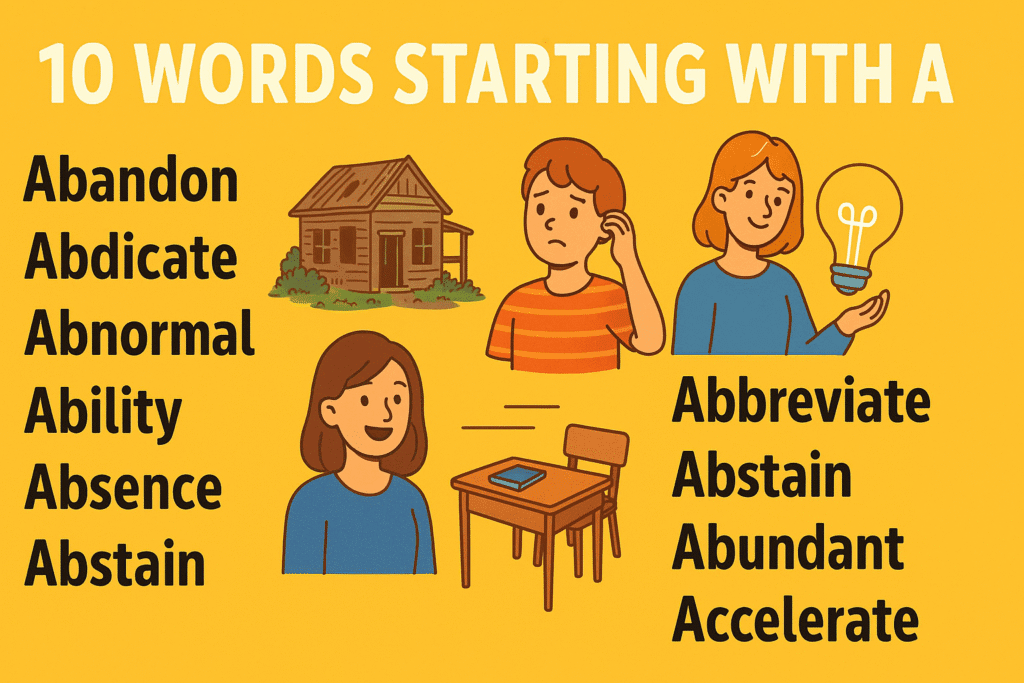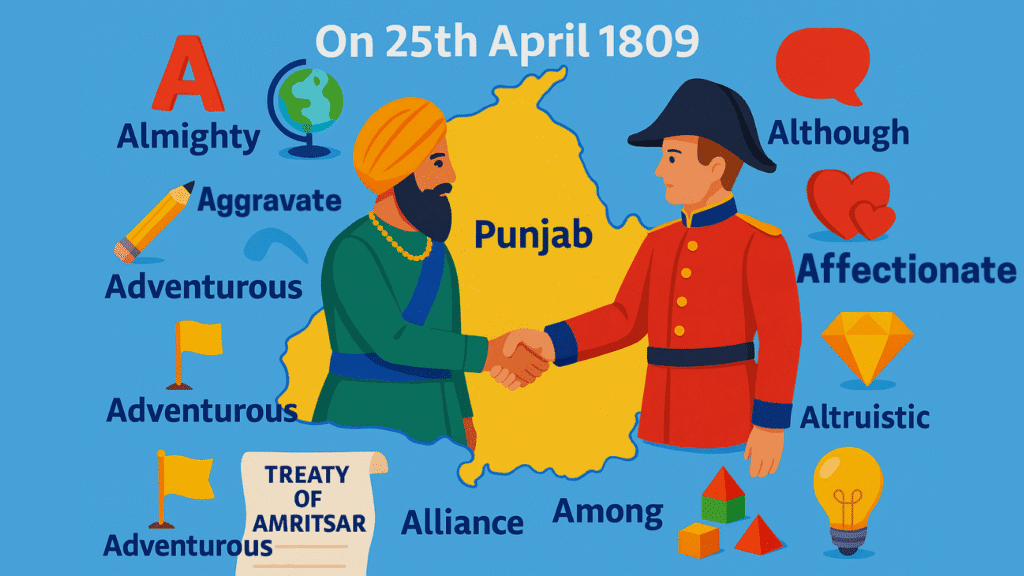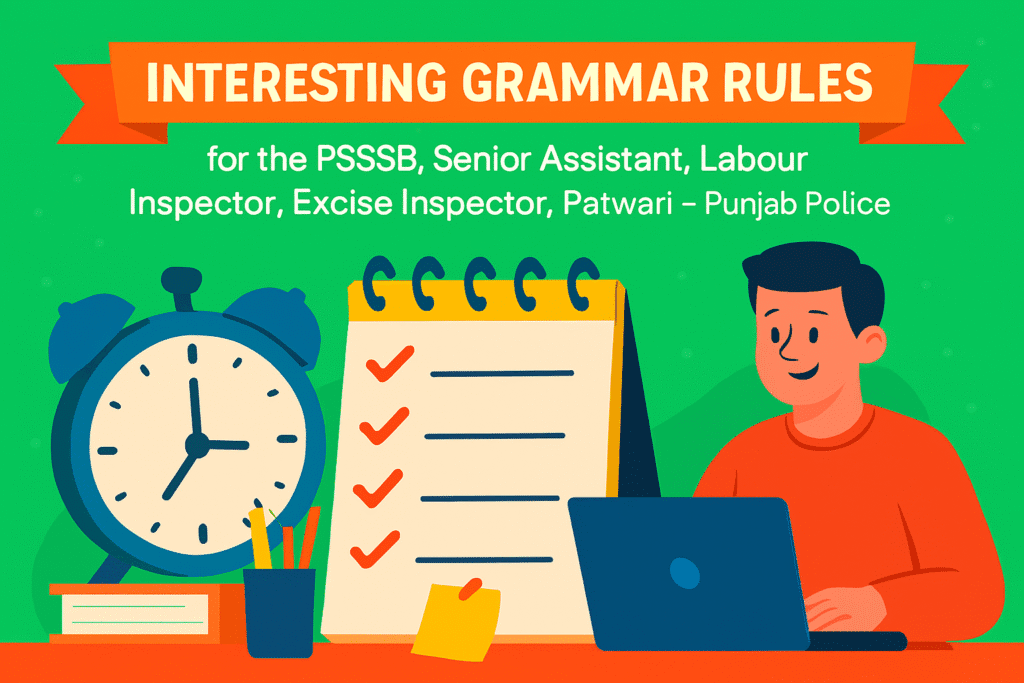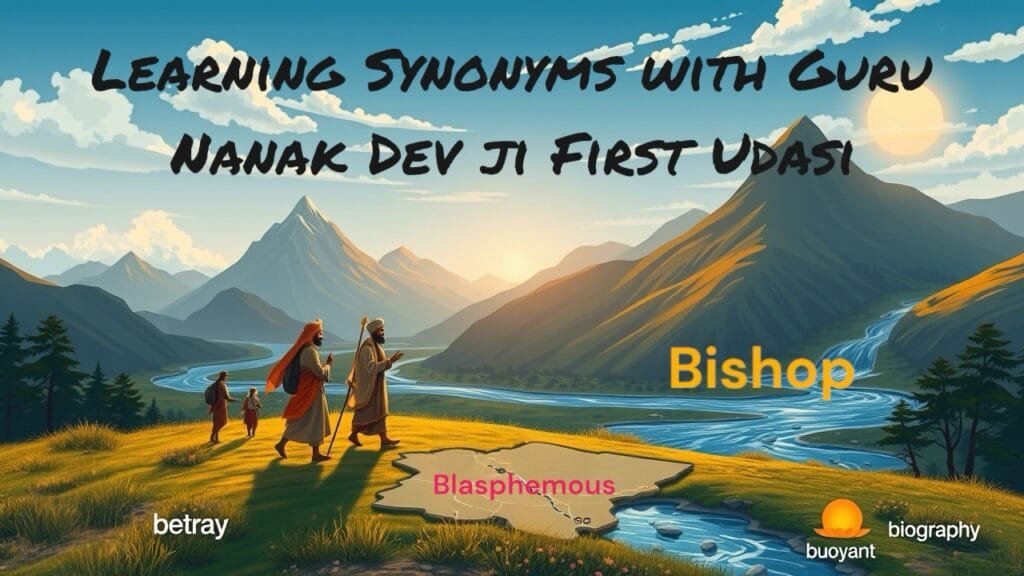
Are you preparing for PSSSB, PCS, Punjab Police, Punjab Patwari, Excise Inspector, or any other Punjab government exam? Then you already know how important vocabulary is for scoring well in the language section. A strong vocabulary not only helps in comprehension and writing but also gives you an edge in competitive exams.
This article is part of our ongoing series on synonyms, where we simplify difficult words and provide better alternatives to improve your writing and speaking skills. If you haven’t read the previous parts, make sure to click here and catch up before diving into Part 5! Stay tuned, learn smart, and boost your exam preparation!
In the journey of competitive exams, mastering vocabulary is crucial. This guide not only enhances your word power but also provides a deeper understanding of each term through meanings, Punjabi translations, and contextual sentences. Let’s dive into the world of words with a story of Guru Nanak Dev Ji and Wali Qandhari, which beautifully illustrates the importance of humility and wisdom.
Table of Contents
Guru Nanak Dev Ji and Wali Qandhari
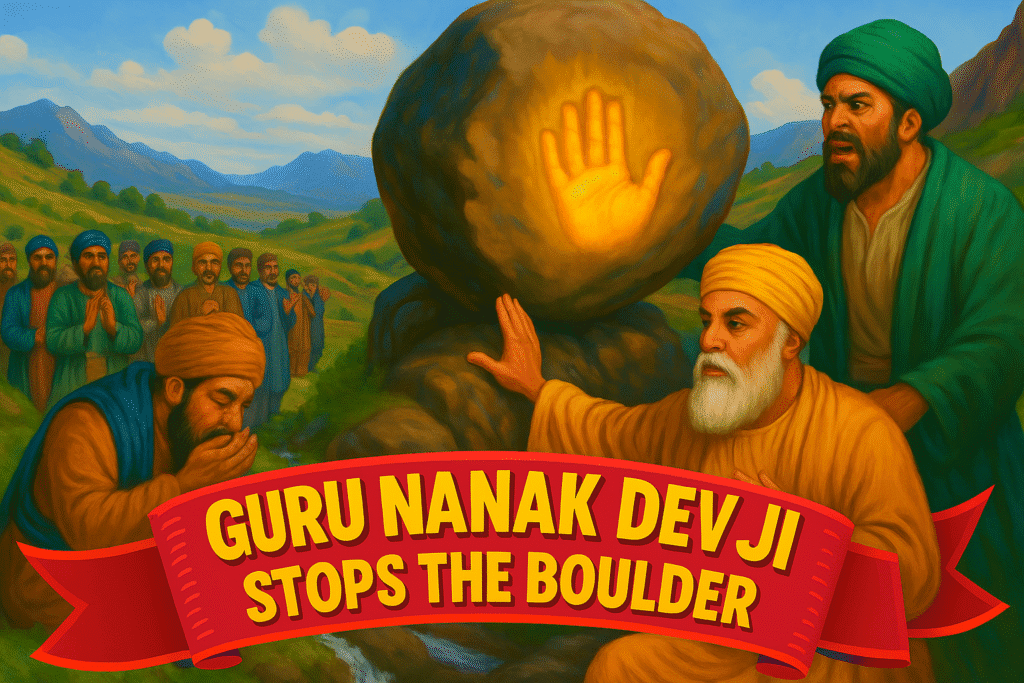
Once, Guru Nanak Dev Ji and Bhai Mardana traveled to Hassan Abdal (now in Pakistan). Bhai Mardana was very thirsty, but there was no water nearby. A rich and aristocrat saint, Wali Qandhari, lived on a high hill. He had a fresh water spring near his house.
Bhai Mardana requested Wali Qandhari for water, but he was arrogant and refused, saying,
“Go to your Guru! If he is so powerful, let him give you water.”
Bhai Mardana returned to Guru Nanak Dev Ji and told him everything. Guru Ji smiled and asked him to have faith. Then, Guru Ji touched a rock, and suddenly, a fresh water spring appeared. The water was audible as it flowed down, and Bhai Mardana happily drank it.
When Wali Qandhari saw this, he was shocked and became angry. In his artificial pride, he pushed a large rock toward Guru Ji, thinking it would stop him. But when the rock reached Guru Ji, he simply raised his hand. The rock stopped, and Guru Ji’s handprint (Panja) remained on it forever.
Seeing this miracle, the people gave a loud applause and started respecting Guru Ji even more. Wali Qandhari realized his mistake and understood Guru Ji’s greatness. He came down to meet Guru Ji with awkward feelings and asked for forgiveness.
Some people around Wali Qandhari were jealous of Guru Ji. They tried to spread false stories, thinking of harming him like an assassin. But Guru Ji, with his wisdom and kindness, won their hearts instead.
After this event, many people became aspirants of Guru Ji’s teachings, and the place became known as Panja Sahib. Today, it is a sacred place of arrival for thousands of devotees.
The story teaches us that arrogance never wins, and true wisdom comes with humility.
Vocabulary List with Meanings, Punjabi Translations, and Sentences for competitive exams
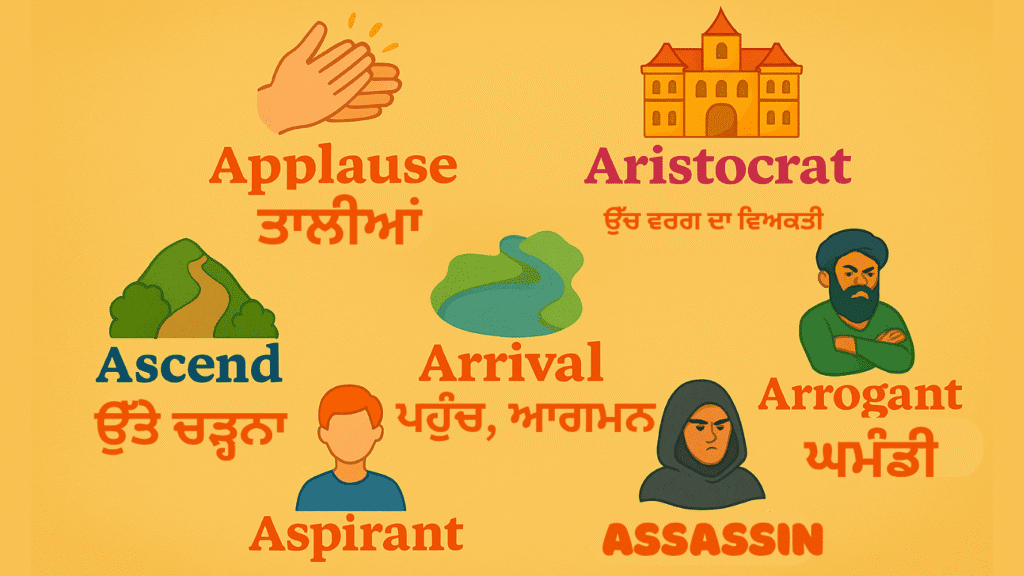
- Applause (ਤਾਲੀਆਂ)
- Meaning: The sound of people clapping to show appreciation.
- Punjabi Meaning: ਸ਼ਲਾਘਾ ਜਾਂ ਪ੍ਰਸ਼ੰਸਾ ਵਜੋਂ ਬਜਾਈਆਂ ਜਾਣ ਵਾਲੀਆਂ ਤਾਲੀਆਂ।
- Sentence: The audience gave a loud applause after the speech.
- Punjabi Sentence: ਭੀੜ ਨੇ ਭਾਸ਼ਣ ਤੋਂ ਬਾਅਦ ਜ਼ੋਰਦਾਰ ਤਾਲੀਆਂ ਵਜਾਈਆਂ।
- Aristocrat (ਉੱਚ ਵਰਗ ਦਾ ਵਿਅਕਤੀ)
- Meaning: A person belonging to a high or noble class.
- Punjabi Meaning: ਇੱਕ ਉੱਚ ਜਾਤੀ ਜਾਂ ਰਿਆਸਤਦਾਰ ਵਰਗ ਨਾਲ ਸੰਬੰਧਤ ਵਿਅਕਤੀ।
- Sentence: The aristocrat lived in a grand palace.
- Punjabi Sentence: ਉੱਚ ਵਰਗ ਦੇ ਵਿਅਕਤੀ ਨੇ ਇੱਕ ਸ਼ਾਨਦਾਰ ਮਹਲ ਵਿੱਚ ਰਹਿੰਦਾ ਸੀ।
- Arrival (ਪਹੁੰਚ, ਆਗਮਨ)
- Meaning: The act of coming to a place.
- Punjabi Meaning: ਕਿਸੇ ਥਾਂ ਤੇ ਪਹੁੰਚਣ ਦੀ ਕ੍ਰਿਆ।
- Sentence: We were excited about the arrival of Guru Nanak Dev Ji.
- Punjabi Sentence: ਅਸੀਂ ਗੁਰੂ ਨਾਨਕ ਦੇਵ ਜੀ ਦੇ ਆਗਮਨ ਲਈ ਉਤਸ਼ਾਹਿਤ ਸੀ।
- Arrogant (ਘਮੰਡੀ)
- Meaning: A person who thinks they are better than others.
- Punjabi Meaning: ਜੋ ਆਪਣੇ ਆਪ ਨੂੰ ਹੋਰਾਂ ਤੋਂ ਵਧੀਆ ਸਮਝਦਾ ਹੋਵੇ।
- Sentence: The arrogant man refused to help the poor.
- Punjabi Sentence: ਘਮੰਡੀ ਵਿਅਕਤੀ ਨੇ ਗਰੀਬਾਂ ਦੀ ਮਦਦ ਕਰਨਾ ਸਵੀਕਾਰ ਨਹੀਂ ਕੀਤਾ।
- Artificial (ਨਕਲੀ)
- Meaning: Made by humans, not natural.
- Punjabi Meaning: ਇਨਸਾਨ ਦੁਆਰਾ ਬਣਾਇਆ ਗਿਆ, ਕੁਦਰਤੀ ਨਹੀਂ।
- Sentence: These flowers are not real; they are artificial.
- Punjabi Sentence: ਇਹ ਫੁੱਲ ਅਸਲੀ ਨਹੀਂ, ਇਹ ਨਕਲੀ ਹਨ।
- Ascend (ਉੱਤੇ ਚੜ੍ਹਨਾ)
- Meaning: To go up or climb.
- Punjabi Meaning: ਉੱਚਾਈ ਵਲ ਜਾਣਾ ਜਾਂ ਚੜ੍ਹਨਾ।
- Sentence: The saint ascended the mountain to meditate.
- Punjabi Sentence: ਸੰਤ ਨੇ ਧਿਆਨ ਕਰਨ ਲਈ ਪਹਾੜ ਤੇ ਚੜ੍ਹਨਾ ਸ਼ੁਰੂ ਕੀਤਾ।
- Aspirant (ਚਾਹਵਾਨ, ਉਮੀਦਵਾਰ)
- Meaning: A person who wants to achieve something.
- Punjabi Meaning: ਜੋ ਕਿਸੇ ਚੀਜ਼ ਦੀ ਪ੍ਰਾਪਤੀ ਲਈ ਯਤਨ ਕਰ ਰਿਹਾ ਹੋਵੇ।
- Sentence: The aspirant worked hard to become a teacher.
- Punjabi Sentence: ਉਮੀਦਵਾਰ ਨੇ ਅਧਿਆਪਕ ਬਣਨ ਲਈ ਘਣੀ ਮਹਨਤ ਕੀਤੀ।
- Assassin (ਸੰਘੀ ਹੱਤਿਆਰਾ)
- Meaning: A person who kills someone secretly.
- Punjabi Meaning: ਕੋਈ ਵਿਅਕਤੀ ਜੋ ਗੁਪਤ ਤਰੀਕੇ ਨਾਲ ਕਿਸੇ ਦੀ ਹੱਤਿਆ ਕਰਦਾ ਹੋਵੇ।
- Sentence: The king was killed by an assassin.
- Punjabi Sentence: ਰਾਜੇ ਦੀ ਹੱਤਿਆ ਇੱਕ ਸੰਘੀ ਹੱਤਿਆਰੇ ਵੱਲੋਂ ਕੀਤੀ ਗਈ।
- Audible (ਸੁਣਨ ਯੋਗ)
- Meaning: Loud enough to be heard.
- Punjabi Meaning: ਜੋ ਆਸਾਨੀ ਨਾਲ ਸੁਣਿਆ ਜਾ ਸਕੇ।
- Sentence: The speaker’s voice was not audible in the back.
- Punjabi Sentence: ਭਾਸ਼ਣ ਦੇਣ ਵਾਲੇ ਦੀ ਆਵਾਜ਼ ਪਿੱਛੇ ਬੈਠੇ ਲੋਕਾਂ ਨੂੰ ਸੁਣਨ ਯੋਗ ਨਹੀਂ ਸੀ।
- Awkward (ਅਣਪਛਾਤਾ, ਅਸੁਵਿਧਾਜਨਕ)
- Meaning: Not comfortable, embarrassing.
- Punjabi Meaning: ਅਸੁਵਿਧਾਜਨਕ ਜਾਂ ਔਖਾ ਮਹਿਸੂਸ ਹੋਣ ਵਾਲਾ।
- Sentence: He felt awkward while speaking in front of the crowd.
- Punjabi Sentence: ਉਹ ਭੀੜ ਅੱਗੇ ਬੋਲਣ ਦੌਰਾਨ ਅਣਪਛਾਤਾ ਮਹਿਸੂਸ ਕਰ ਰਿਹਾ ਸੀ।
FAQs
Q1: Why is vocabulary important for competitive exams?
A1: Vocabulary is crucial for competitive exams as it enhances comprehension, improves writing skills, and helps in solving verbal ability questions efficiently.
Q2: How can I improve my vocabulary for exams?
A2: Regular reading, using flashcards, practicing with synonyms and antonyms, and engaging in vocabulary-building exercises can significantly improve your word power.
Q3: Are Punjabi translations helpful for non-Punjabi speakers?
A3: Yes, Punjabi translations can be beneficial for understanding the cultural context and for those who are bilingual or learning Punjabi.
Q4: How often should I revise vocabulary?
A4: Consistent revision is key. Daily practice and weekly reviews can help retain new words effectively.
Q5: Can stories like Guru Nanak Dev Ji and Wali Qandhari aid in learning?
A5: Absolutely. Stories provide context, making it easier to remember words and their meanings through relatable scenarios.

